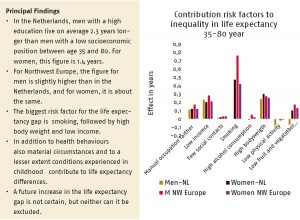Educational differences in life expectancy: The contribution of eight risk factors
“A substantial reduction of inequalities in life expectancy requires policy actions on a broad range of health determinants”
This study assessed the effect of different risk factors on life expectancy differences between men and women in the Netherlands aged 35 to 80 years with a high or low education. The data were compared with figures for Northwest Europe. Risk factors considered were manual profession father, low income, few social contacts, smoking, high alcohol consumption, little exercise and low fruit and vegetable consumption.

Key Takeaways for the Industry
- Not only health behaviours, but also material circumstances and circumstance during childhood explain the gap in life expectancy between the lower and higher educated.
- A substantial reduction of inequalities in life expectancy requires policy actions on a broad range of health determinants.
Want to know more?
Read the paper of Wilma Nusselder, Jose Rubio Valverde en Johan Mackenbach (Erasmus MC) ‘Educational differences in life expectancy: The contribution of eight risk factors’ (Dutch only)


